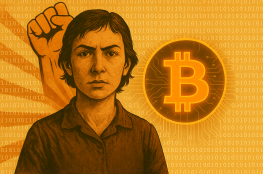by Dr. Mark Stephany, President of The Progressive Bitcoin, Inc.
The Bitcoin protocol represents a monetary network that is open, private, permissionless, and resistant to confiscation. It empowers individuals with self-sovereignty, granting them control over their financial transactions without interference from external authorities. Central to Bitcoin’s ethos is the belief that individuals should be personally responsible for their wealth and transactions, free from governmental oversight dictating how they store or use their money. As illustrated in the symbolic message embedded in Bitcoin’s genesis block, this ethos challenges paternalistic financial systems that prioritize institutional control over individual autonomy.
This prompts a critical question: Should the ethos of self-sovereignty inherent in the Bitcoin protocol apply equally to the domain of bodily autonomy and health? Through the lens of abortion rights and reproductive justice, I argue that self-sovereignty is an even more compelling principle when applied to personal health and bodily autonomy. If individuals are entitled to economic freedom and control over their financial assets, should they not also have the right to make autonomous decisions about their bodies? While one may disagree with how another person spends their money or makes decisions about their health, the principle of self-sovereignty stands as either unequivocal or conditional—it cannot be both.
For those who advocate for reproductive justice and a person’s right to choose, there is a strong parallel in supporting economic systems like Bitcoin that reinforce individual autonomy and economic justice. Conversely, proponents of Bitcoin’s decentralized and permissionless monetary model should also consider supporting the bodily autonomy that underpins reproductive justice.
Beyond Bodily and Economic Choice: Privacy and Justice
“The decision to fight for choice rather than justice is itself a decision to appeal to those who already have choices.” — Marlene Gerber Fred
“There is no choice when there is no access.” — SisterSong
Reproductive justice extends beyond the narrow frameworks of choice and privacy. It encompasses the right to have children, the right not to have children, the right to parent with dignity, and access to the resources needed to exercise these rights. Legal historian Laurence M. Friedman observed that the post-Roe v. Wade United States evolved into a “republic of choice,” emphasizing autonomy and individualism. Yet, as Justice Ruth Bader Ginsburg repeatedly noted, the Roe framework’s focus on privacy was insufficient to address systemic inequities that limit access to reproductive healthcare. Similarly, the perception of Bitcoin as merely a speculative financial asset fails to capture its broader implications for economic justice. Bitcoin is not merely an opt-in monetary network; it is a protocol that challenges traditional, exclusionary financial systems and offers a pathway toward financial autonomy.
The shortcomings of Roe highlight the intersection of reproductive privilege and socioeconomic disparity: privacy assumes resources that many lack, especially those dependent on government assistance. In parallel, Bitcoin addresses financial privilege by providing access to a decentralized, borderless monetary system free from inflationary policies, confiscation, and discriminatory practices. Just as reproductive justice advocates for equity beyond the right to an abortion, Bitcoin represents more than an asset; it serves as a tool for economic empowerment in a society that has historically marginalized vulnerable populations.
Reproductive Justice and Economic Access: Bridging the Gap
Over 1,200 abortion restrictions or bans have been enacted since Roe v. Wade in 1973, with over 230 introduced in the past five years. The Hyde Amendment, passed shortly after Roe, prohibits federal funds from being used for abortion services, except in cases of rape, incest, or life endangerment. This legislation disproportionately affects low-income individuals who rely on Medicaid, further restricting access to reproductive care. More recently, some states have introduced bills that criminalize financial assistance for abortion services, such as Missouri’s proposed legislation targeting those who “aid or abet” abortion-related expenses.
Bitcoin offers a practical countermeasure to these financial barriers. As a peer-to-peer monetary protocol, it enables individuals to transfer funds directly, without intermediaries, delays, or restrictions. For example, if someone in Missouri seeks reproductive care in Chicago, Bitcoin can facilitate timely and secure payment for services. By removing barriers such as settlement delays, geographic restrictions, and Know-Your-Customer (KYC) regulations, Bitcoin empowers individuals to access essential services in a manner aligned with the principles of reproductive justice.
Conclusion
The convergence of reproductive justice, economic justice, and Bitcoin reveals a shared commitment to autonomy, equity, and access. This paper does not seek to argue the merits of abortion or Bitcoin but to highlight the underlying principles that support both. The reproductive rights movement has evolved from emphasizing privacy and choice to a broader framework of reproductive justice, which seeks equitable access and dignity for all individuals. Similarly, Bitcoin transcends its identity as a financial asset, embodying an open, permissionless, and non-confiscatable monetary protocol that advances economic justice.
The fight for bodily and economic autonomy requires both positive and negative liberties: the promotion of access and education alongside freedom from surveillance, censorship, and discrimination. Bitcoin, as a decentralized monetary system, represents a critical tool in the ongoing pursuit of justice—economic, reproductive, and beyond.





